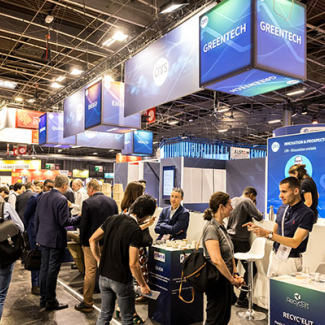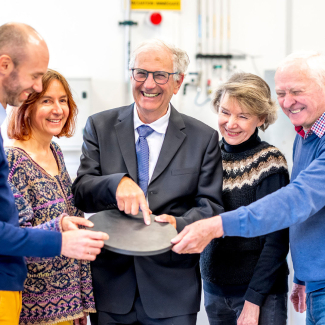
The CNRS is coordinating the 'Climate, Biodiversity, Sustainable Societies' programme agency
In December 2023, the President of the French Republic announced the launch of seven programme agencies. The CNRS was asked to coordinate the 'Climate, Biodiversity, Sustainable Societies' agency. The agency's new executive director Elsa Cortijo explains the project's ambitions and spirit.
What are the 'Climate, Biodiversity, Sustainable Societies' programme agency's missions?
Elsa Cortijo1 : The mission of the seven agencies2 is to enhance the coordination of the activities of research stakeholders and optimise the overall organisation of the research and innovation ecosystem, particularly to provide better responses to the major challenges society is facing.
The agencies' mission is based on the remit of the former thematic research alliances3 particularly the Alliance for Environmental Research (AllEnvi) (French link) in the case of 'Climate, Biodiversity, Sustainable Societies'. The core tasks for our agency will therefore be to structure and drive communities, organise monitoring and dynamic foresight work on a number of major social issues, analyse essential research and technological facilities and infrastructures for the scientific community, map France's current presence in major European research programmes and finally steer and coordinate national research programmes including Priority Research Programmes and Equipments.
Each agency will also be tasked with the national steering of research programmes deemed of strategic interest because of their high impact on society and importance in terms of sovereignty. They will also respond to any government requests.
I also envisage another mission for the 'Climate, Biodiversity, Sustainable Societies' agency – to be receptive to issues that are important for civil society and inspire research projects likely to interest several partners. In doing so, I aim to position the agency as a meeting place where civil society and research can both initiate dialogue with each other. Research will run its own projects following scientific criteria and procedures and will pass on the knowledge acquired to civil society. This will also be a space for research to find out about the preoccupations of civil society and translate them into new research themes and issues.
What are to be your first projects heading the agency?
EC: Between now and the end of the year, we will need to set up the agency's governance which must have three levels. The first is with the State via a liaison committee which mandates the agency to define the necessary programmes and actions and which the agency also reports to. The second is with all the partner members of the agency through a committee that defines strategy and programme guidelines. Finally, the smooth running of the agency will be ensured by an operational committee made up of the seven mission leaders who would like to get involved from the partners concerned. I believe this collegiate dimension will enable the agency to respond to orders from the State, take into account and work on questions and proposals from the partners while guaranteeing their representativeness towards the CNRS.
Finally, in a six-month timeframe, the agency will have to define and propose between one and three innovative and ambitious research themes to the State based on priority scientific issues.
You often evoke the agency's partners. Who are they? And what role will the agency play in the French scientific landscape?
EC: There are already 31 partners (see box below) and others might well be joining! We contacted all the founding and associate members of AllEnvi, which involved France's national research bodies and associations of higher education and research establishments. Among AllEnvi members, Ifremer (French Research Institute for Exploitation of the Sea) which focuses on study of the ocean is obviously very present as a major climate change and marine biodiversity stakeholder. We then added several organisations or agencies whose missions are in tune with our own objectives – the INED, INSERM, OFB and ADEME4 . To dovetail effectively with the scientific community we included a partner from industry with the ANRT (National Association for Research and Technology), the Régions de France association and the Association des Villes Universitaires de France are our local authority partners and the France Nature Environnement federation of associations represents the citizens' associative sector.
We adopted this collegiate organisation to federate our partners around the agency and construct it together. The agency will take on subjects that are not part of the organisations' usual remits and promote exchanges to transcend existing boundaries between these establishments. Essentially the agency will act as a 'project manager' with one or more members of the agency being put in charge of 'project management' for each initiative.
And, of course, the 'Climate, Biodiversity, Sustainable Societies' agency will regularly exchange with the other programme agencies, particularly the agency the INRAE (National Research Institute for Agriculture, Food and Environment) has been asked to coordinate. It will mean we can work together on research issues that go beyond the remit of a sole organisation towards goals that cannot be achieved alone or bilaterally.
- 1CNRS research professor at the Laboratory for Sciences of Climate and Environment (CNRS / CEA / Université de Versailles Saint-Quentin-en-Yvelines).
- 2The other six agencies are: 'Decarbonised Energy' and 'From Components to Digital Systems and Infrastructures' CEA; 'Space' coordinated by the CNES; 'Food, Agriculture, Forests and Associated Natural Resources' coordinated by the Inrae; 'Numerics, Software and Algorithms' coordinated by the Inria and 'Health' coordinated by the Inserm.
- 3The five thematic research alliances were set up in 2009 in the framework of the launch of France's National Research and Innovation Strategy. They are consultation groups which work on bringing together the main public research institutions and the Ministry in charge of research to coordinate research and development priorities in certain identified sectors.
- 4Institute for Demographic Studies (INED), National Institute of Health and Medical Research (INSERM), French Biodiversity Agency (OFB), French Agency for Ecological Transition (ADEME).
"The CNRS's broad range of disciplines makes us the natural leader for this agency"
Antoine Petit : "The CNRS is the leading producer of science on the issues covered by the 'Climate, Biodiversity and Sustainable Societies' agency and has been asked to coordinate it. Also, the CNRS is the scientific leader or co-leader of around fifteen PEPRs whose themes are directly or indirectly within this agency's scope. We also operate the vast majority of research infrastructures in this field and so can support the partners involved as these collective tools are ramped up.
Our main responsibility will be to make this agency function as a collegiate body to create synergies between the many academic stakeholders and ensure science and research can effectively serve the State, industry, local authorities and NGOs, by developing partnerships between these sectors."
The 31 partners of the 'Climate, Biodiversity, Sustainable Societies' agency
- Agence de l'environnement et de la maîtrise de l'énergie (Ademe)
- Agence nationale pour la gestion des déchets radioactifs (Andra)
- Association nationale de la recherche et de la technologie (ANRT)
- Agence nationale de sécurité sanitaire de l’alimentation, de l’environnement et du travail (Anses)
- Association des villes universitaires de France (Avuf)
- Bureau de recherches géologiques et minières (BRGM)
- Conférence des directeurs des écoles françaises d'ingénieurs (CGE)
- Commissariat à l’énergie atomique (CEA)
- Centre d'études et d'expertise sur les risques, la mobilité et l'aménagement (Cerema)
- Centre de coopération internationale en recherche agronomique pour le développement (Cirad)
- Conférence des grandes écoles (CGE)
- Centre national d'études spatiales (CNES)
- Centre national de la recherche scientifique (CNRS)
- France Universités
- France Nature Environnement (FNE)
- Institut français du pétrole – énergies nouvelles (Ifpen)
- Institut français de recherche pour l'exploitation de la mer (Ifremer)
- Institut géographique national (IGN)
- Institut national de l'environnement industriel et des risques (Ineris)
- Institut national d'études démographiques (Ined)
- Institut national de la santé et de la recherche médicale (Inserm)
- Institut national de recherche pour l'agriculture, l'alimentation et l'environnement (Inrae)
- Institut national de recherche en sciences et technologies du numérique (Inria)
- Institut de recherche pour le développement (IRD)
- Institut de radioprotection et de sûreté nucléaire (IRSN)
- Laboratoire national de métrologie et d'essais (LNE)
- Météo France
- Muséum national d’histoire naturelle (MNHN)
- Office français de la biodiversité (OFB)
- Régions de France
- Service hydrographique et océanographique de la Marine (Shom)


